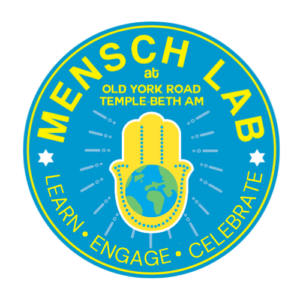 Welcome to Mensch Lab!
Welcome to Mensch Lab!
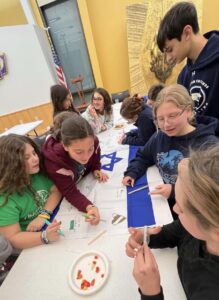 Mensch Lab, the lower school at Old York Road Temple-Beth Am for students from Kindergarten until B Mitzvah, is a cutting-edge model of Jewish education focused on imparting joy. Nothing is more important to us than creating an association between religious school and the happiest times of our students’ youth, inculcating a proud Jewish identity that endures for a lifetime.
Mensch Lab, the lower school at Old York Road Temple-Beth Am for students from Kindergarten until B Mitzvah, is a cutting-edge model of Jewish education focused on imparting joy. Nothing is more important to us than creating an association between religious school and the happiest times of our students’ youth, inculcating a proud Jewish identity that endures for a lifetime.
All our students, from Kindergarten through pre-B Mitzvah grade 6/7, attend Mensch Lab on Sundays from 9:30 am to 12:00 noon. Every Sunday begins with a breakfast at 9:00 am, where parents meet our teachers and catch up with other parents and students. Our Sunday breakfasts build a sense of extended family – the hallmark of our synagogue – and ensure parents are continually informed of their children’s progress.
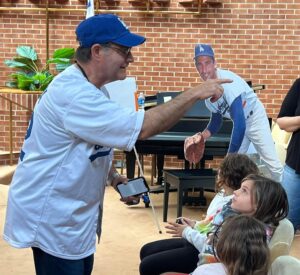 Our students in grades 4, 5 and pre-B Mitzvah grade 6/7 attend Mensch Lab twice a week: Sundays from 9:30 am to 12:00 noon and Tuesdays from 5:00 pm to 7:00 pm. Our Tuesday Mensch Lab sessions have a different flavor than Sundays. With our students already having attended a full day of secular school, we begin our Tuesday Mensch Lab sessions with dinner and a rap session in which students tell us their “oys and joys” of the week. Our unique Tuesday model, stressing social interaction in recognition of students’ midweek needs, has earned the praise of students and parents alike.
Our students in grades 4, 5 and pre-B Mitzvah grade 6/7 attend Mensch Lab twice a week: Sundays from 9:30 am to 12:00 noon and Tuesdays from 5:00 pm to 7:00 pm. Our Tuesday Mensch Lab sessions have a different flavor than Sundays. With our students already having attended a full day of secular school, we begin our Tuesday Mensch Lab sessions with dinner and a rap session in which students tell us their “oys and joys” of the week. Our unique Tuesday model, stressing social interaction in recognition of students’ midweek needs, has earned the praise of students and parents alike.
The curriculum
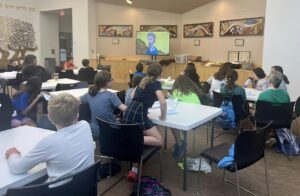 On Sundays, students from Kindergarten through grade 3 explore Judaism on a deeply personal level. We focus on Shabbat, Jewish holidays and rituals, begin Hebrew and prayers, and lay the groundwork for every student’s loving relationship with Israel, from the people to the land to the Modern State.
On Sundays, students from Kindergarten through grade 3 explore Judaism on a deeply personal level. We focus on Shabbat, Jewish holidays and rituals, begin Hebrew and prayers, and lay the groundwork for every student’s loving relationship with Israel, from the people to the land to the Modern State.
Instead of keeping students confined to the classroom, we rotate them around our synagogue for regular sessions with Rabbi Lieb and Cantor Zarkh, and for special sessions with folk singers and Jewish hip-hop artists. Music, art, stories, movement and play are the order of the day. With intention, the atmosphere is like a carnival, constantly moving, constantly keeping our students intrigued as to what happens next.
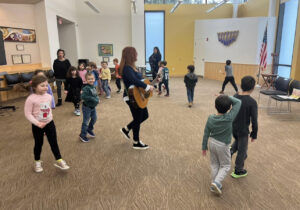 Mensch Lab is also among the select Jewish religious schools in the country to offer electives. Our Sunday electives, open to students from Grade 3 to pre-B Mitzvah grade 6/7, currently include Junior Choir, Bibliodrama, Modern Israel, Spiritual Journaling, and Yoga and Mindfulness.
Mensch Lab is also among the select Jewish religious schools in the country to offer electives. Our Sunday electives, open to students from Grade 3 to pre-B Mitzvah grade 6/7, currently include Junior Choir, Bibliodrama, Modern Israel, Spiritual Journaling, and Yoga and Mindfulness.
Once our students reach grade 4, we integrate our unique Mensch Lab curriculum, “Jewish Heroes, Jewish Values.” We cover a wide range of heroes and values throughout the year. One week, we’ll focus on tikvah, hope. Another week we’ll focus on ometz lev, courage. And yet another week, we’ll focus on tzedek, justice, and so on
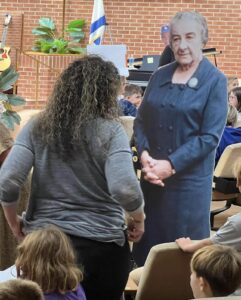 Every value has a corresponding Jewish hero about whom we draw comparisons to each student’s own self. When we present hope, for instance, we teach how Golda Meir maintained hope for a new State of Israel against the longest odds. We then guide students to draw from her personal traits to nurture their own optimism and resilience.
Every value has a corresponding Jewish hero about whom we draw comparisons to each student’s own self. When we present hope, for instance, we teach how Golda Meir maintained hope for a new State of Israel against the longest odds. We then guide students to draw from her personal traits to nurture their own optimism and resilience.
To that end, grade 4 is where we introduce current events in Israel at an age-appropriate level. Old York Road Temple-Beth Am has a rich tradition of standing with Israel, including during the toughest times.
“Jewish Heroes, Jewish Values” at Mensch Lab sets the stage for our upper school for post-B Mitzvah teens, Beit Noar. You can read more about Beit Noar here.
Mensch Lab honors the menschlikheit of Rabbi Harold B. and Elise Waintrup, both of blessed memory, and the character of our entire synagogue community.
Learn more about our special programs!
At Old York Road Temple-Beth Am we pride ourselves in our ability to make becoming a b. mitzvah a positive learning experience for each child and family. Beginning with the child’s education in our Mensch Lab, the family is involved in a variety of activities that encourage learning and doing “Jewish” together. Old York Road Temple – Beth Am Lab partners with Moving Traditions (www.movingtraditions.org) on a family education-focused approach to b-mitzvah that connects Jewish wisdom to the inter-personal and social elements that come up as our children enter the teen years—and the additional challenges of doing so in the wake of a pandemic.
The Moving Traditions sessions – created by rabbis, social workers, and educators – aim to help parents and their preteens to explore what it means to celebrate this milestone, to be the center of attention during a life cycle ritual, to navigate expectations from friends and family, to find Jewish meaning in the ceremony, as well as examine other social-emotional challenges and joys associated with the b. mitzvah.
Families’ participation in the Moving Traditions family education sessions aim to enrich our families’ and students’ experiences. These learning sessions promote the b. mitzvah as a “becoming a teen” life cycle transition, marked by personal growth and positive communal connection.
In addition to the family and social-emotional connections we build into the b. mitzvah preparation process, our students also participate in a rigorous Hebrew program. This component of their study prepares them for their participation in the Shabbat morning service when they are called to the Torah as a b. mitzvah.
Every child at Old York Road Temple-Beth Am receives a Jewish education according to their ability. This is the case for the b. mitzvah as well. All students begin their formal training with a b. mitzvah teacher about 9-12 months before the actual service. These are individual lessons for preparation chant and teach about the Torah and Haftarah as well as for review of the prayers.
Our clergy and leadership work with every family to adapt the b. mitzvah service to special circumstances and necessary accommodations. We want students to feel as though they push themselves in this process; we want them to feel that they have achieved something; but we do not want them to feel that the experience of reaching Jewish meaning is beyond their grasp. Through close coordination with the Rabbis, Cantor, teachers and parents, the Shabbat morning service is tailored to enable each child to successfully participate in becoming a b. mitzvah.
Click HERE to go to Beit Noar webpage
Keeping Graduates Connected! Our hope is to stimulate the hearts, minds (and appetites!) of the next generation, the young scholars pushing out into the wider world. We facilitate activities to keep the recent high school graduates and young adults of Beth Am community and the Jewish community connected. These young friends meet with many new challenges and experiences, and we want them to know that the clergy and their synagogue family is here to support, lend a helping hand or just be a sounding board for things they are encountering. We like to recognize and celebrate each young person’s accomplishments along their respective journeys. For more information or to sign up to be part of our Young Friends group please contact the administrative office at (215) 886-8000.
